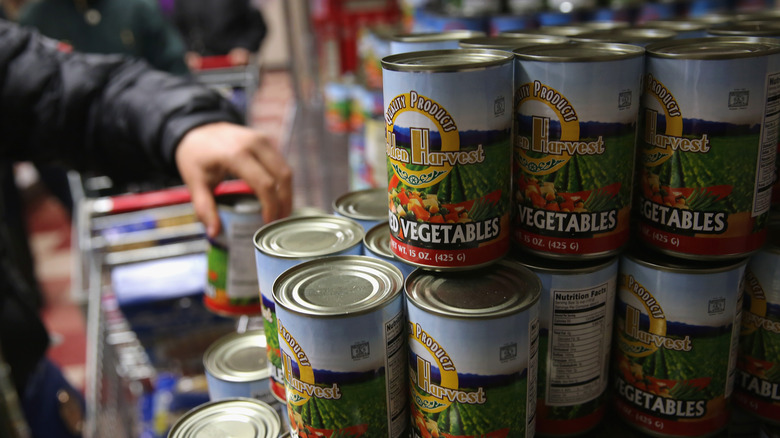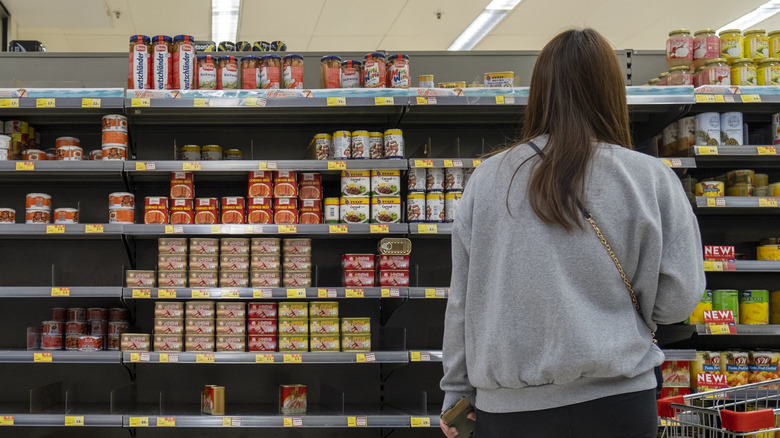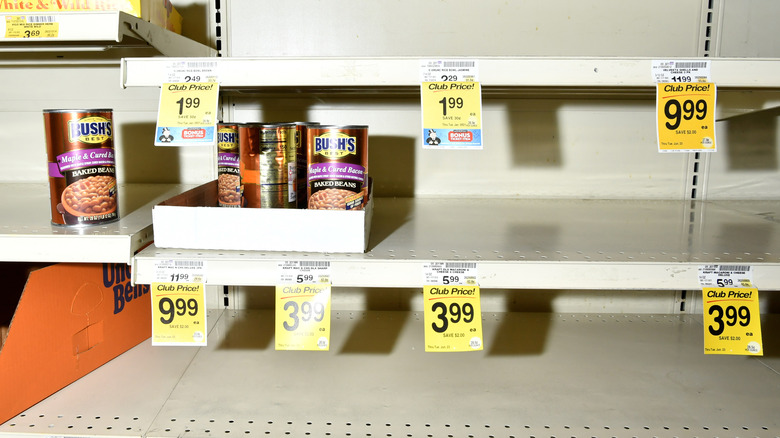
By Hope Ngo/Aug. 26, 2021 9:20 am EDT
It doesn’t take much to see why canned goods are our go-to when the going gets tough. While some of these shelf-stable products can have a less-than-stellar reputation on the nutrition front, they are still robust, hardy sources of food. They’re so reliable they merit a mention on FEMA’s list of must-haves in the event of a national emergency.
Canned foods were among the first items to fly off the shelf during the early, pandemic-related panic buying spree of 2020, along with toilet paper, household cleaners, oat milk, bread, and chicken wings. Buyers were also hoarding Spam, tuna, canned corn, and canned soup (via Food & Wine) at speeds that made it difficult, if not impossible, for food companies and retailers to keep up (via The Wall Street Journal).
As COVID-19’s more contagious Delta variant zips around the country, many are now wondering whether the canned food shortages that we saw last year might be making a comeback, even though pandemic expert Dr. Anthony Fauci has said the country will not be locking down, since enough people have been vaccinated against the disease (via Reuters). There is little doubt that we can expect to continue to see shortages across the board, but the reason that drives this shortage is not that simple.
Groceries are still feeling the impact of 2020's panic buying spree
When the pandemic first kicked up in 2020, it also triggered a chain of challenges which remain unresolved to this day, thanks to gaps involving raw materials and the labor market (via The Wall Street Journal). In the case of canned corn for instance, Food & Wine noted that the pandemic hoarding exercise ate up sweet corn inventories that could not be replenished until the next planting and harvest season. Given this, it will be a while until more sweet corn returns to the market. The same goes for canned or bottled tomatoes, which need to be grown before they can be canned or bottled as ketchup or sauce.
Food companies aren’t just battling a shortage of ingredients; they’re trying to resolve packaging problems too, because items like aluminum — which is used to make the cans themselves — are also in short supply. That was the problem pickle manufacturers encountered when they discovered that while they had the goods, there weren’t enough glass jars to go around.
Food industry executives are bracing for shortages through 2022
Even without the Delta variant, The Wall Street Journal reported those in the food industry were resigned to seeing disruptions and shortages that could continue until 2022. And with the Delta variant taking over some states like Florida, consumers aren’t likely to relax anytime soon.
Research conducted by Inmar Intelligence last month and reported by Supermarket News found that of 1,000 respondents surveyed in early August, nearly 70% said they’re thinking about restocking essential items, 46% already have contingency supplies at the ready at home, and 12% have said they’re ready to start putting groceries aside in response to the Delta variant. Holly Pavlika, Inmar’s senior vice president of corporate marketing says: “Beyond the fear of stepping outside their home to grocery shop, 30% of respondents said they’re stockpiling because they’re concerned that the products they need will be out of stock, and 18% are worried that prices will go up.”
Because of all this uncertainty generated by COVID-19, Pavlika says: “All in all, we have created a new shopper segment: ‘the Squirrel,’ who will always have a stash in their home.”
Source: Read Full Article

